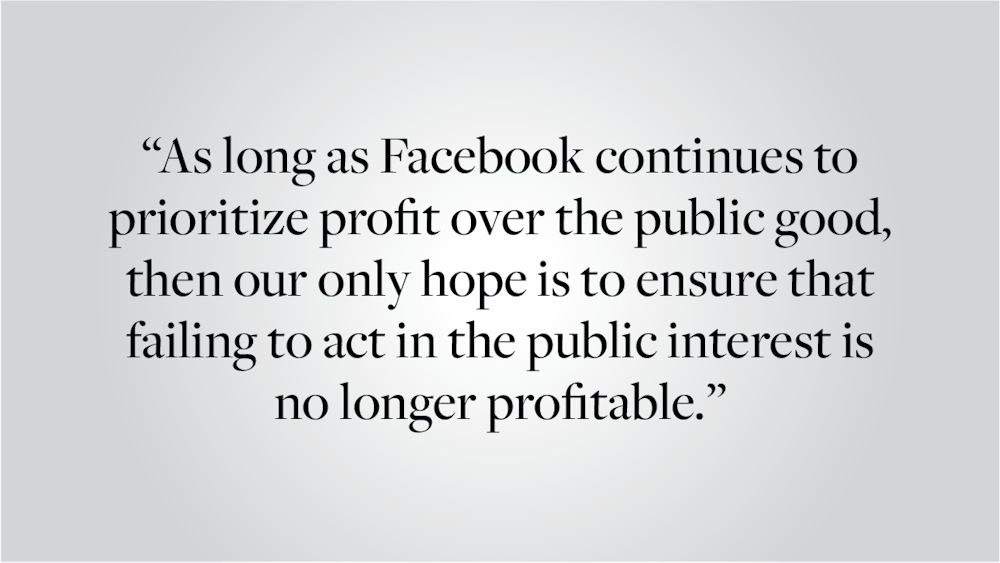The University’s endowment generated a 51.5% return in Fiscal Year 2021, adding $194 million to the University’s operating budget. This record gain is one of the highest endowment returns reported by Ivy League institutions this quarter, setting Brown’s overall endowment at $6.9 billion.
Over the past several years, there have been increased calls for colleges, particularly major research universities with large endowments such as Brown, to divest from the fossil fuel industry. Just this year, in fact, Harvard pledged to make its investments fossil fuel neutral by 2050. The University of California, the University of Michigan, Oxford University, Cambridge University, Georgetown University and others have made similar pledges. While Brown hasn’t made a specific pledge, as of June 2018, the University had sold most of its oil and gas investments.
Just as the divest movement aims to “take away the social license” of Big Oil to exacerbate climate change in the name of corporate profit, endowed universities should similarly move to divest from other socially irresponsible corporations — particularly, from corrosive “Big Tech” companies such as Facebook. According to the Wall Street Journal, Brown has significant investments in Skye Global Management LP, which as of mid-2020, listed Facebook among its top five investments. And considering that Brown’s investment in tech companies including Facebook has almost doubled over the past three years, the University has an especially strong obligation to divest from portfolios that include Facebook, considering its direct implication in numerous real-world atrocities.
Facebook, which has recently renamed itself Meta, has a well-documented history of facilitating violence. A 2018 United Nations report concluded that Burmese military propaganda shared on Facebook was primarily responsible for the ethnic cleansing of Myanmar’s Rohingya Muslim population. According to the Washington Post, dozens of rioters who stormed the U.S. Capitol on Jan. 6, 2021 used Facebook to coordinate transportation to and from the Capitol, not to mention that the platform failed to contain the widespread claims of election fraud that inspired this insurrection in the first place.
While the social media platform has taken steps to remove disinformation from its sites over the past few years, Facebook is far from a neutral arbiter of information. Not only has Facebook been hijacked by bad actors seeking to spread disinformation, but Facebook’s radicalizing algorithms themselves have been shown to encourage extremism. By allowing hate speech and misinformation to fester on its platforms, Facebook’s algorithmic failures have emerged as a proximate cause for offline violence. Even more damning, as the recent Wall Street Journal investigation “The Facebook Files” and whistleblower Frances Haugen’s scathing congressional testimony reveal, it seems that Facebook has long known about these vast issues with their site—they have simply chosen to ignore them in the name of increasing shareholder profit.
As Haugen’s accusations reveal, failing to make meaningful reforms has remained one of Facebook’s most profitable courses of action thus far. (Even in light of these troubling findings, Facebook has managed to reap a $9 billion profit this quarter, surpassing investor predictions). Consequently, as long as Facebook continues to prioritize profit over the public good, our only hope is to ensure that failing to act in the public interest is no longer profitable. And by pulling their investments, major research universities would be sending Zuckerberg a clear message.
Admittedly, Brown’s endowment returns — that can at least be partially attributed to portfolios including Facebook — can help fund tangible improvements for current and future students. In fact, as a result of the impressive 2021 endowment gains, Brown has recently expanded financial aid by nearly $25 million. However, funding these important reforms should not have to come at the expense of ethical investing, particularly considering the ways that Facebook's negligence threatens harm to Brown students specifically.
As fellow Herald columnist Anika Bahl ’24 eloquently pointed out in a column last week, internal documents revealed that Facebook and Instagram knew that their platforms were actively worsening teenage body image. Likewise, Facebook’s hate speech breeding algorithms can be directly linked to increased incidents of identity-based violence, which can actively threaten the safety of Brown students of color and other marginalized communities. While these problems are certainly not caused by Facebook alone, the company’s exacerbation of these issues demands accountability that only its investors are able to provide.
Truth be told, it may be virtually impossible to craft an investment portfolio that can’t be linked to some negative social consequence in one way or another. While this may be a fair critique, Facebook is one of few companies that can be directly and publicly tied to ethnic cleansing and a full-blown insurrection.
As it currently stands, according to Institutional Investments, Brown’s significant investments in the tech sector may be the driving force behind the past two years’ impressive endowment returns. However, considering the sheer scale of Brown’s endowment, wherever the University invests its money will inevitably have a sizable social impact that extends far beyond College Hill. As a result, it should be more important for Brown to prioritize ethical investing, not less — and when it comes to companies with a negative social impact, Facebook nearly takes the cake.
Sarah McGrath ’24 can be reached at sarah_v_mcgrath@brown.edu. Please send responses to this opinion to letters@browndailyherald.com and op-eds to opinions@browndailyherald.com.





